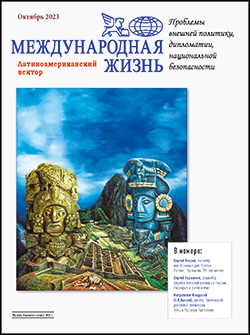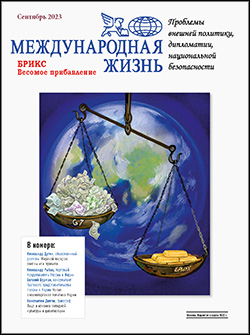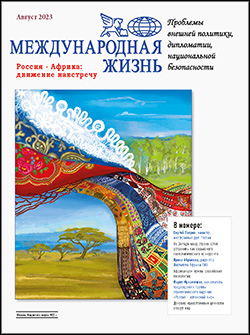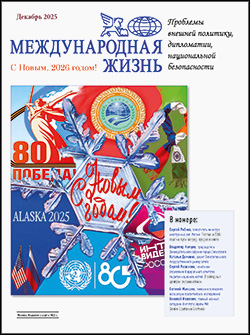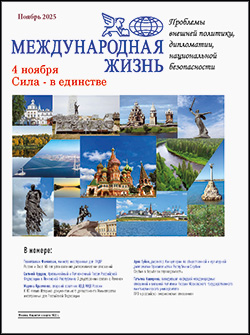Mikhail Myasnikovich, Vladimir Kovalev
Practical results and new horizons of Eurasian integration. To the tenth anniversary of the Eurasian Economic Commission
November 2021 marks the tenth anniversary of the decision to establish the Eurasian Economic Commission. The EEC contributed to the transformation of the Customs Union and the Single Economic Space into the Eurasian Economic Union and today effectively implements its main tasks, including ensuring the conditions for the functioning and development of the Union, as well as developing proposals in the field of economic integration within the EAEU.
Keywords: integration, Eurasian Economic Union (EAEU), Eurasian Economic Commission (EEC), economy, industrial cooperation, Great Eurasian Partnership, international organization, international law
Jan Burliai, Boris Nekrasov
Interaction of Amazonian countries of South America in the context of global challenges of our time
Topics related to the Amazon River basin, covering half of South America, occupy a prominent place in international discussions about climate change, depletion of natural resources or environmental degradation due to anthropogenic impact on nature.
Keywords: Amazonia, Amazon River basin, Amazon Pact, ODSA, international cooperation, sustainable development, challenges
Mikhail Troyansky, Oleg Karpovich, Alina Davydova
Latin American vector of Russia's Foreign Policy: new challenges and threats
In recent years, Russian diplomacy has achieved confident results in building a solid framework of Russian-Latin American relations. This was facilitated by common values, shared principles of cooperation and a similar political strategy, including fidelity to the balance of interests in international relations, strengthening international security and stability.
Keywords: Russian-Latin American relations
Alexander Borisov
Political Poker in the Nuclear Age, or Bluff as a Policy
Of all the gambling games at the card table, the American elite traditionally preferred poker. However, if bluff is quite acceptable in cards and even often brings a solid gain, then in politics it is definitely contraindicated and fraught with dangerous consequences...
Keywords: world order, world order, world in the XXI century, world politics
Alexey Kupriyanov
Indo-Pacifica as a Geopolitical Construct: India's Approach and Russia's Interests
Geopolitical constructs are a relatively new phenomenon in world political practice, so far their formation often occurs spontaneously. One of the most complex, contradictory and ambiguous geopolitical constructs has become the Indo-Pacific region, or, as it is commonly called for short, Indo-Pacifica.
Keywords: Indo-Pacific region, ITR, constructivism, India, Russia, China, geopolitics, critical theory
Ekaterina Narkhova, Olga Lobanova
New trends in the formation of the international information security system in Asia
Russia has traditionally supported open, inclusive mechanisms related to ensuring international information security in the Asia-Pacific region. Against this background, the creation of a number of block-by-nature structures based on the so-called "Indo-Pacific concept", in particular Quad and AUKUS, calls into question the possibility of jointly countering threats to the security of ICTs and ICTs themselves, which contradicts the interests of all countries in the region, including Russia.
Keywords: international information security, threats in the information space, OEWG, ASEAN, Asia-Pacific region, Indo-Pacific region, Quad, AUKUS
Alexey Podtserob
About the reasons for the growth of Salafism
The analysis of the activities of Islamist organizations is complicated by the fact that groups that are not related to each other often operate within their framework. The number of Salafists in the world reaches 50 million people, and their activity extends to 80 countries of the world. However, it should be noted that Salafi jihadists represent no more than 10 million so far. Muslims, which is only 1% of those who profess Islam.
Keywords: Salafism, fundamentalism, Islam, Muslims
Alex Inozemtsev
Notes of an intourist
Diplomats abroad are certainly subject to the embassy routine. But the main thing is that they study the host countries. Deeply: and the mechanisms of power, and its creators, and politics, and economics, and culture. In general, everything. But sometimes tourists may know more about the particulars. If they are lucky with guides. And also, if they can compare the stories of the guides with their own knowledge. I want to share some of them. Will they suddenly come in handy?
Keywords: Jerusalem, Cairo, Ankara, Tripoli, Baalbek, Hanoi
Mikhail Malakhov, Viktor Shlyakhin
Ryazan and Russian America
In 2009, the first Ryazan expedition to Alaska took place in the footsteps of the famous Russian traveler L.A. Zagoskin. Then new routes were laid to the distant "Russian-American" coast. And fate presented an unexpected historical fact: the Orthodox educator of America, the Monk Herman of Alaska (1751-1836), was also from the Ryazan land.
Keywords: Russian America, Reverend Herman of Alaska, Ryazan expeditions to Alaska
Kirill Terentyev
The view of Italian diplomacy of the fascist period on the development of the Zionist movement in the context of Palestinian issues
Mussolini, realizing the inability to use the resource of the Palestinian mandate in his own interests, at the turn of 1936-1937, by leaps and bounds began to draw closer to the Arab nationalist movements. Relying on the Muslim world, he hoped to strengthen Italian political and economic positions in the Middle East.
Keywords: England, Zionism, Zionist Commission, Palestine
Nikita Bondarenko
Historical politics in Russian-Japanese relations: contradictions and ways to overcome them
Historical problems in modern Russian-Japanese relations are a serious obstacle to cooperation between the two countries. In order to break out of the fetters of historical contradictions, it is important to find new approaches to assessing the events of the past from both sides. Understanding the specifics of Japan's historical policy is one of the key factors in building the Russian strategy.
Keywords: historical politics, historical memory, Russian-Japanese relations, Russia, Japan, Northern Territories, territorial dispute, Kuril Islands, oblivion
Mikhail Konarovsky
Information support of foreign policy activities as a national security zone
Until recently, Russian historiography has paid insufficient attention to the tactics and methodology of manipulating public consciousness, implemented with the help of modern ICT and used by states to achieve their foreign policy goals. O.A.Melnikova's monograph "Manipulation of Public Opinion and Global cybersecurity" is devoted to understanding this topic.
Keywords: ICT, global cybersecurity
Nikolay Turko
Global threats to security and stability: a new cyber reality
The monograph "International security, strategic stability and information technologies" is devoted to the most pressing problems of our time related to threats from the malicious use of information and communication technologies, which is most important for strengthening global security and protecting Russia's national interests in the international arena.
Keywords: global threats, international security, strategic stability, information technology, cyber reality
Читайте другие материалы журнала «Международная жизнь» на нашем канале Яндекс.Дзен.
Подписывайтесь на наш Telegram – канал: https://t.me/interaffairs

 12:51 20.11.2021 •
12:51 20.11.2021 • 